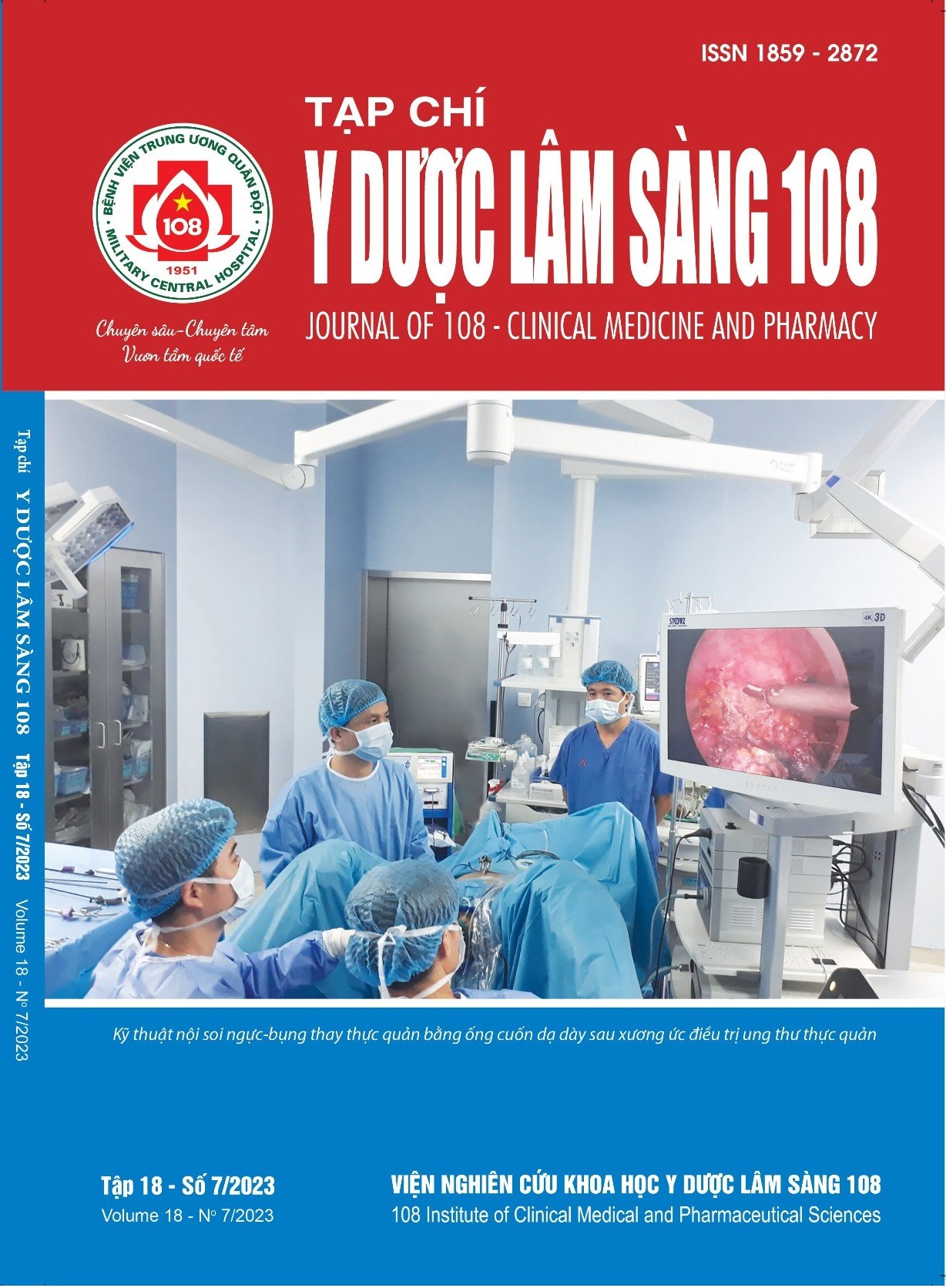Evaluation of the results of using cefuroxime as prophylatic antibiotic in percutaneous nephrolithotomy at 108 Military Central Hospital
Main Article Content
Keywords
Abstract
Objective: To evaluate the results of using cefuroxime as prophylactic antibiotic in PCNL. Subject and method: 56 patients undergoing PCNL (percutaneous nephrolithotomy) from February 2022 to February 2023 at the Department of Urology, 108 Military Central Hospital, were given prophylactic antibiotics cefuroxim 750mg - 1.5g (750mg injection for patients < 70kg), 1.5g injection in patients ≥ 70kg), a single intravenous dose 30 minutes before surgery. Selection criteria: Patients without clinical and subclinical bacteriuria, 24h postoperative follow-up: Fever, systemic inflammatory response syndrome, complete blood count, bacteriuria culture. Result: 24 hours after PCNL: There were 8 patients with fever (14.3%), the percentage of white blood cells (BC) 14.3 ± 2.56 (p=0.17). SIRS had 2/56 (3.6%). There were 1/56 (1.8%) patients with positive bacteriuria and blood cultures, 48/56 patients with urinary catheter removed and renal drainage after 2 days, 8/56 patients with urinary catheter and catheter removed. kidney retention > 3 days due to post-operative fever. The average operative time was 41.16 ± 17.14 (20-115) min, discharge after 3.78 ± 1.1 days. Conclusion: Cefuroxim 750mg is used as a prophylactic antibiotic, administered intravenously as a single injection in PCNL, resulting in no postoperative infection of 85.7%, which can replace antibiotics for surgical coverage. Surgery for patients without urinary tract infection, short operative time without intraoperative complications.
Article Details
References
2. Doğan HS, Sahin A, Cetinkaya Y, Akdoğan B, Ozden E, Kendi S (2002) Antibiotic prophylaxis in percutaneous nephrolithotomy: prospective study in 81 patients. J Endourol 16(9): 649-653.
3. Sharifi Aghdas F, Akhavizadegan H, Aryanpoor A, Inanloo H, Karbakhsh M (2006) Fever after percutaneous nephrolithotomy: contributing factors. Surg Infect (Larchmt) 7(4): 367-371.
4. Darenkov AF, Derevianko II, Martov AG, Kotliarova GA, Kondrat'eva EM, Siniukhin VN (1994) [The prevention of infectious-inflammatory complications in the postoperative period in percutaneous surgical interventions in patients with urolithiasis]. Urol Nefrol (Mosk)(2): 24-26.
5. Fourcade RO (1990) Antibiotic prophylaxis with cefotaxime in endoscopic extraction of upper urinary tract stones: a randomized study. The Cefotaxime Cooperative Group. J Antimicrob Chemother. 26 Suppl A: 77-83.
6. Demirtas A, Yildirim YE, Sofikerim M, Kaya EG, Akinsal EC, Tombul ST, Ekmekcioglu O, Gulmez I (2012) Comparison of infection and urosepsis rates of ciprofloxacin and ceftriaxone prophylaxis before percutaneous nephrolithotomy: a prospective and randomised study. The Scientific World Journal. 2012.
7. Wolf JS Jr, Bennett CJ, Dmochowski RR, Hollenbeck BK, Pearle MS, Schaeffer AJ; Urologic Surgery Antimicrobial Prophylaxis Best Practice Policy Panel (2008) Best practice policy statement on urologic surgery antimicrobial prophylaxis. The Journal of urology 179(4): 12.
8. Seyrek M, Binbay M, Yuruk E, Akman T, Aslan R, Yazici O, Berberoglu Y, Muslumanoglu AY (2012) Perioperative prophylaxis for percutaneous nephrolithotomy: randomized study concerning the drug and dosage. J Endourol 26(11): 1431-1436.
 ISSN: 1859 - 2872
ISSN: 1859 - 2872
